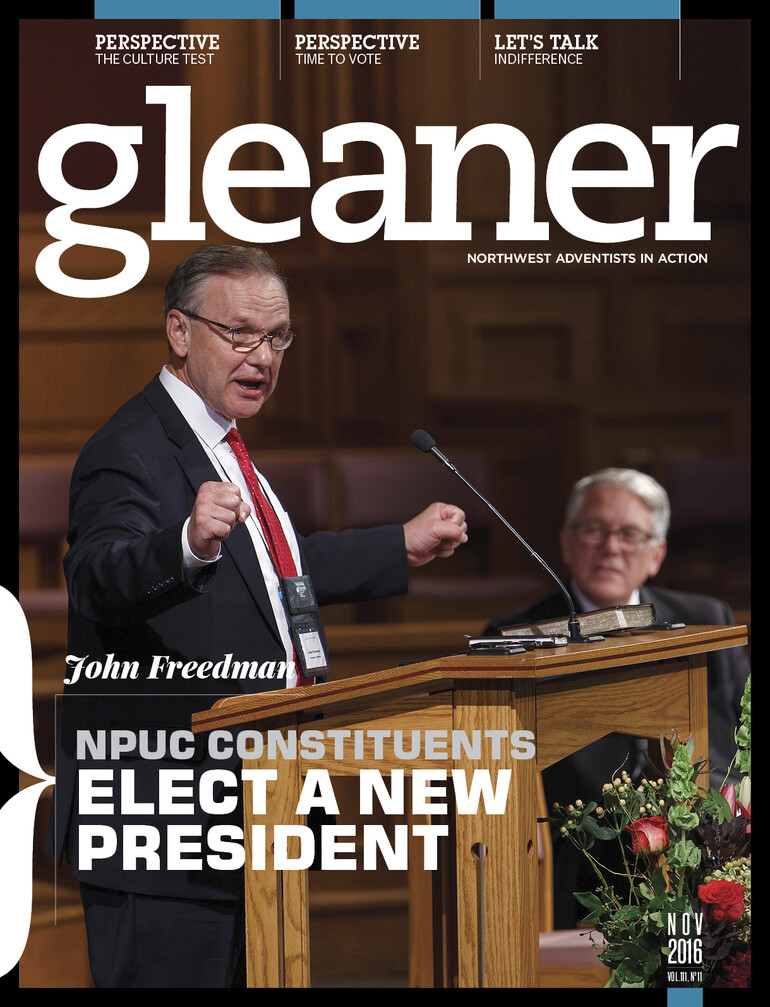This month, the brash and bruising presidential campaign finally ends and Americans will vote. Many find it difficult to choose. Meanwhile, there’s another election that offers a clear choice, with eternal significance.
Two competing candidates in the Great Controversy between good and evil campaign for our vote to be lord of our lives — with drastically different motives and outcomes. “I am the Good Shepherd,” Jesus declares. The devil “comes only to steal and kill and destroy. I came that they may have life and have it abundantly” (John 10:11, 10).
Eden’s tree of temptation was Adam’s voting booth for life or death. In rejecting the giver of life, Adam chose death for us all.
Hey, wait a minute! What gave Adam such power over us? Because he was the father of humanity, and whatever fathers do affects their families. When dad is drunk, the family endures his hangover. If he divorces their faithful mom, kids suffer the loss.
Did you know that the name “Adam” means “man” or “humanity”? He was our representative — a bus driver with us all on board. In twisting the steering wheel of his own free choice the wrong way, he wrecked the lives of us all. Thus “sin came into the world through one man, and death through sin, and so death spread to all men” (Rom. 5:12).
Unfair! Indeed. That’s why God provided another option, so we can ourselves vote between eternal life or death.
Christ’s Alternative Humanity
Enter Jesus, humanity’s new representative. God so loved the world, He sacrificed His Son for all humanity to restore everything we lost in fallen Adam.
The Bible describes Jesus as another Adam (1 Cor. 15:45) — head of a new humanity. All of us died in the old Adam, and all of us died in the new Adam: “One has died for all, therefore all have died” (2 Cor. 5:14). So Jesus not only died for us, He died as us — as the Son of Man, our representative.
The old Adam died our death at a tree, in Eden. The new Adam also died our death at a tree and “tasted death for everyone” (Heb. 2:9). The old Adam’s humanity brought us to ruin, but in Christ’s new humanity we are restored to God’s presence. Both humanities are available to us. Eternal life or death depends upon our choice between the two.
Accepting God’s Acceptance
America’s coming election involves not just the presidency but the House of Representatives. Suppose your congressperson is voting for things you don’t agree with. The solution is simple — elect a new representative.
See the connection? Adam as your representative cast a vote for death at the tree in the Garden of Eden. If you don’t like that, you can vote him out of office in your life by choosing Jesus as your representative. That’s how you get saved.
Let’s make this practical. Maybe you’ve thought that proving yourself a worthy person by successfully imitating the life of Christ is the way to be a Christian. No, that’s how to be a Buddhist or a Hindu. Millions of them respect Jesus as a worthy example and teacher of ethical principles, along with other notable gurus and ascended masters.
The good news of the gospel is not that God can turn you into a little jesus to compete with the real Jesus. Imitating Christ is not how to become a Christian. Accepting your identity in Christ is how we are born again.
I used to imagine if I followed Jesus faithfully enough, God might one day, with eyebrows raised, grant me provisional status as a disciple. But when we read the Gospels, we discover that’s not how Jesus gets disciples. He accepts them right up front. “Follow me,” He invited Peter, James, John and the others. He drew them into His presence with full acceptance despite all their shortcomings. The only uncertainty was whether they would choose to forsake business as usual and accept Christ’s acceptance.
Not everyone did. Jesus offered a rich young ruler His salvation — who rejected it and returned to his old familiar life.
Worth a Million?
Suppose tomorrow a real estate agent knocks on your door. Her client in a limo out there wants to buy your house for a million dollars. “Look!” she says. “He’s even signed the contract.”
You could keep them waiting while you spent the day worrying that your house isn’t worth a million dollars or fantasizing what you might do to make it worthy. Or you could gratefully choose to accept your benefactor’s guaranteed offer and live out its benefits for the rest of your life, freely giving as you have received.











